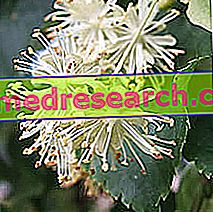
Scientific name
Tilia cordata ; Tilia platyphyllos
Family
Tiliaceae
Origin
Europe
Used Parts
Drug consisting of dried flowers (Official Pharmacopoeia)
Chemical constituents
- Flavonoids;
- saponins;
- Tannins;
- Polyphenols;
- Polysaccharides (arabinogalattans);
- mucilage;
- Minerals;
- C vitamin.
Tiglio in Herbalist: Properties of Tiglio
Linden flowers are mainly used in the form of an infusion with diaphoretic properties, useful for encouraging sweating during acute febrile or cooling infectious diseases, or for sedative purposes (only or in association with other sedative drugs).
In fact, the linden is endowed with modest sedative activity, which can be used safely even in the pediatric field.
Biological activity
Many properties are attributed to the linden, among which we recall those astringent, diaphoretic, sedative, emollient and, above all, antispasmodic and antitussive. In fact, the use of this plant has been officially approved for the treatment of respiratory disorders, such as, indeed, coughs and bronchitis.
The emollient, antispasmodic and antitussive properties are probably due to the mucilage and the essential oil contained in the plant.
Furthermore, a study showed that the alcohol extract of linden flowers has antimicrobial activity in vitro. The constituents responsible for this activity seem to be essential oil and tannins. While flavonoids have been shown to have anti-edema activity in animal studies.
Another research, however, has shown that the fumigations performed with linden flowers can be a valid aid in alleviating the symptoms of the common cold.
Linden against cough and bronchitis
As mentioned above, thanks to the emollient, antitussive and antispasmodic properties possessed by the lime tree, this plant can be successfully used to treat coughs and bronchitis, giving relief to patients suffering from it.
To treat these disorders, the lime tree can be taken internally in the form of an infusion. Generally, it is advisable to pour an adequate amount of boiling water on 2-4 grams of drug and leave it to infuse for about 5-10 minutes.
Linden in folk medicine and homeopathy
In folk medicine, lime is used as a remedy against catarrh and as a stomachic, as well as a remedy to promote diuresis.
Other unapproved uses of this plant consist in using the coal obtained from it to treat intestinal disorders (internal use) and venous ulcers in the lower limbs (external use).
Linden leaves, on the other hand, are used as a diaphoretic remedy; while the linden wood is used to treat liver and gall bladder disorders and to combat cellulite.
Linden is also used in homeopathic medicine. It can be found in the form of granules or diluted mother tincture, with indications for the treatment of anxiety, stress and insomnia and to promote diuresis.
The amount of homeopathic remedy to be taken can vary from individual to individual, also depending on the type of homeopathic dilution used.
See also: lime extracts in cosmetics
Contraindications
Avoid taking lime-based preparations in case of heart disease or hypersensitivity to one or more components.
Pharmacological Interactions
- not known



